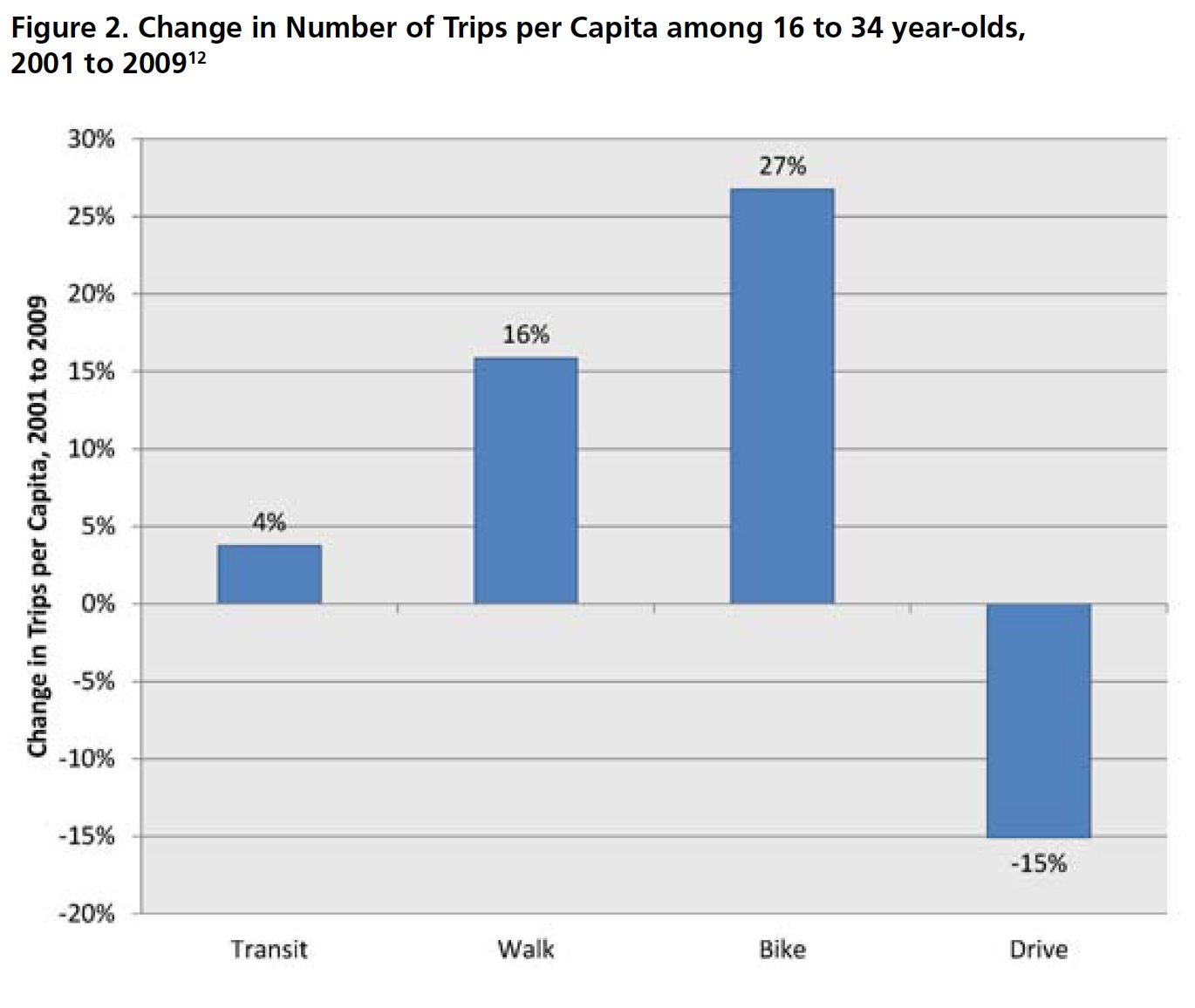U.S. PIRG EDUCATION FUND
Executive Summary
Over the last decade—after 60-plus years of steady increases—the number of miles driven by the average American has been falling. Young Americans have experienced the greatest changes: driving less; taking transit, biking and walking more; and seeking out places to live in cities and walkable communities where driving is an option, not a necessity. Academic research, survey results and government data point to a multitude of factors at play in the recent decline in driving among young people: socioeconomic shifts, changes in consumer preferences, technological changes, efforts by state governments and colleges to limit youth driving, and more.
Millennials (those born between 1983 and 2000) are the nation’s largest generation, making their transportation needs particularly important. They have the most to gain or lose from the transportation investment decisions we make today, as they will be affected by those investments for decades to come. If Millennials drive fewer miles than previous generations as they age—and if future generations of young people follow suit—America will have an opportunity to reap the benefits of slower growth in driving. These include reduced traffic congestion, fewer deaths and injuries on the roads, reduced expenditures for highway construction and repair, and less pollution of our air and climate.
Several indicators—including continued decreases in per-capita driving across the whole U.S. population, the continued shift away from the use of cars for commuting by Millennials, and the consistency of Millennials’ stated preferences for housing and transportation—suggest that it is unlikely that the trend toward less driving among Millennials during the 2000s has reversed thus far in the current decade. Moreover, many of the factors that have contributed to the recent decline in driving among young Americans appear likely to last. Now is the time for the nation’s transportation policies to acknowledge, accommodate and support Millennials’ demands for a greater array of transportation choices.
Millennials are less car-focused than older Americans and previous generations of young people, and their transportation behaviors continue to change in ways that reduce driving.
Between 2001 and 2009, the average number of miles driven by 16 to 34 year-olds dropped by 23 percent, as a result of young people taking fewer trips, shorter trips, and a larger share of trips by modes other than driving. Young Americans drive less than older Americans and use public transportation more, and often use multiple modes of travel during a typical day or week.
In recent years, young people appear to have continued to shift away from driving:
- Census data show that the share of 16 to 24 year-olds traveling to work by car declined by 1.5 percentage points between 2006 and 2013, while the share of young people getting to work by public transportation, on foot or by bicycle, or else working from home, had increased.
- Young people aged 20 to 30 are less likely to move from central cities to suburbs than a decade ago.
- Driver’s licensing among young people has continued to decline. The percentage of high school seniors with driver’s licenses declined from 85 percent to 73 percent between 1996 and 2010, according to the AAA Foundation for Highway Safety, with federal data suggesting that the decline has continued since 2010.
Young people are not the only Americans who are driving less. The number of miles driven by the average American has declined nearly continuously since 2004. Americans now drive no more in total than we did in 2005 and no more on average than we did at the beginning of President Bill Clinton’s second term in office.
Download full version (PDF): Millennials in Motion
About U.S. PIRG Education Fund
uspirgedfund.org
With public debate around important issues often dominated by special interests pursuing their own narrow agendas, U.S. PIRG Education Fund offers an independent voice that works on behalf of the public interest. U.S. PIRG Education Fund, a 501(c)(3) organization, works to protect consumers and promote good government. We investigate problems, craft solutions, educate the public, and offer Americans meaningful opportunities for civic participation. For more information, please visit our website at uspirgedfund.org.
Tags: Millennials, PIRG, U.S. PIRG, U.S. PIRG Education Fund







 RSS Feed
RSS Feed